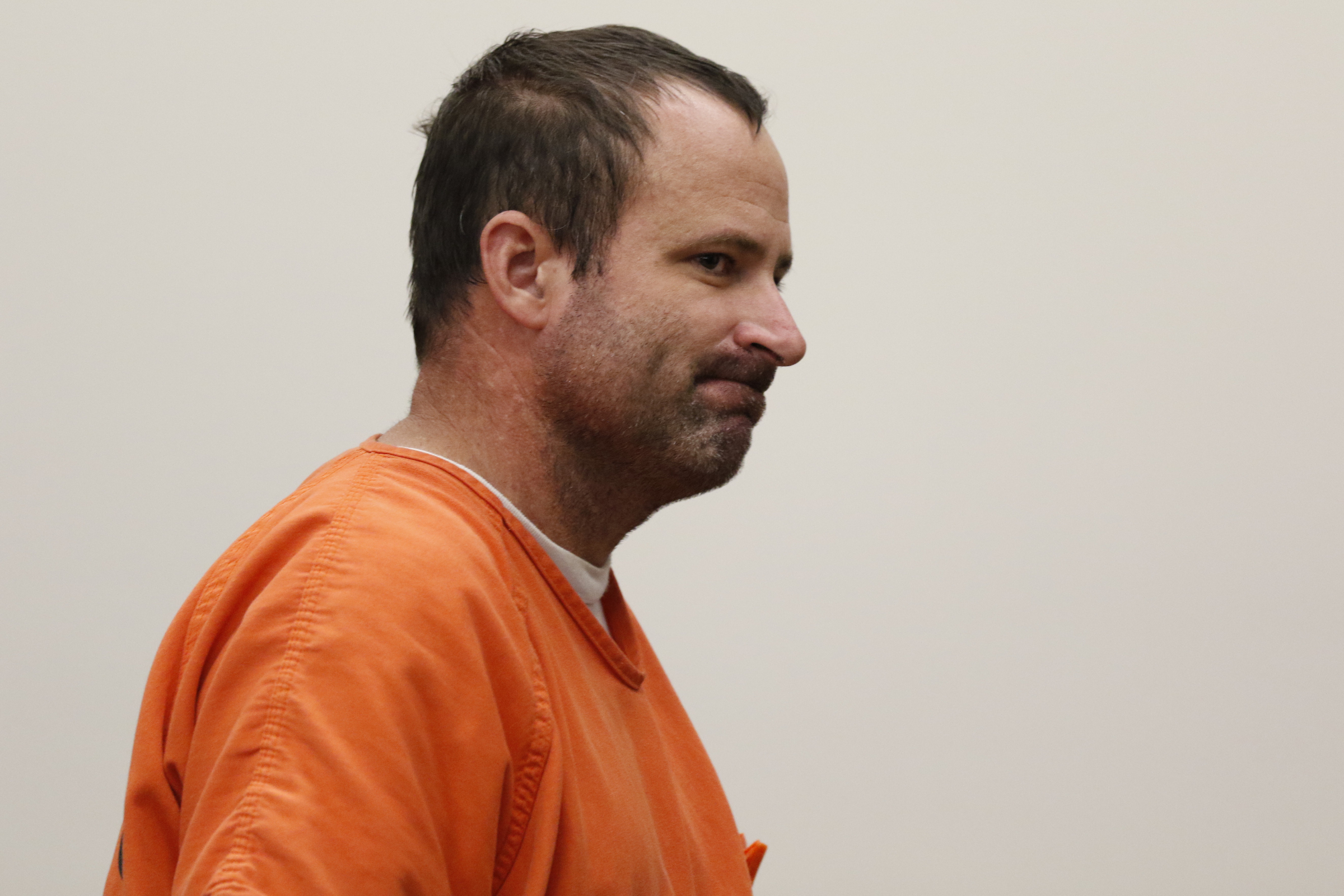 Ben Brewer appears before Judge T. Bruce Bell on charges of trafficking methamphetamine and criminal mischief during a preliminary hearing at Fayetteville County District Court in Lexington, Ky., on Aug. 19, 2015. Brewer, the semi-truck driver involved in the I-75 accident in June that killed six people, was arrested in Lexington, Ky., on Aug. 7, 2015, and faces charges in Tennessee.
Ben Brewer appears before Judge T. Bruce Bell on charges of trafficking methamphetamine and criminal mischief during a preliminary hearing at Fayetteville County District Court in Lexington, Ky., on Aug. 19, 2015. Brewer, the semi-truck driver involved in the I-75 accident in June that killed six people, was arrested in Lexington, Ky., on Aug. 7, 2015, and faces charges in Tennessee.After six people died in a fiery crash on Interstate 75, investigators asked the truck driver who plowed through eight vehicles a question: Did you brake?
"I hope I did," driver Ben Brewer told them.
He didn't.
Investigators with the National Transportation Safety Board found no evidence that Brewer applied the brakes or took any evasive action during the June 25, 2015, crash, when the tractor-trailer he drove smashed into slowed traffic near Exit 11. The truck was traveling between 78 and 82 mph in a 55 mph zone when it hit the first car; the rig rammed into seven more vehicles before finally coming to a stop 453 feet later. Six people died; six others were injured.
On Tuesday, the NTSB ruled that Brewer's fatigue and drug use led to the crash. The 40-year-old was using methamphetamine and likely had gone without sustained rest for the 40 hours before the crash, investigators testified during a hearing in Washington, D.C.
The NTSB report also notes several failings in federal and state regulations that are designed to catch unfit truck drivers before they get behind the wheel, including inadequate background checks and limits to drug testing.
Brewer had crashed seven times in the five years before the June 2015 crash and had been fired from a previous trucking company for testing positive for methamphetamine in 2013. A month before the fatal June crash, he again tested positive for methamphetamine, although that test was not related to his commercial driving.
Despite those red flags, Brewer was still hired by Cool Runnings Express, a small London, Ky., trucking company - in part because the owner, Billy Sizemore, didn't know about Brewer's past.
Trucking companies are required to run a background check on a potential hire's driving history, and in nearly all states, that check includes a list of past crashes.
However, in Kentucky and Idaho the background check does not automatically include crash data, according to the NTSB. So, even though Brewer had crashed four times in the previous three years, those crashes were not included on the background check that Cool Runnings Express reviewed.
Brewer also passed a drug test when he was hired, three days before the fatal crash in Chattanooga. The fact that no drugs were detected in his system - despite his history of methamphetamine use - prompted NTSB investigators to review the effectiveness of the test itself.
"In this case, we had someone who had received the normal, pre-employment drug screen, who had a long history of drug use, and for whatever reason that drug did not show up during the pre-employment test," Robert Molloy, director of the NTSB's Office of Highway Safety, said during the hearing.
Standard urine drug tests can detect some drugs only within a couple of days after the substances were used. Investigators recommended that trucking companies start using hair drug testing instead, because illegal drugs can be detected for a much longer window of time.
"Had the carrier in the crash used a hair drug test, the driver's drug use would have likely been identified," investigator Kenny Bragg said.
Investigators also examined how Brewer was able to be hired even though he'd been fired from a previous trucking company for failing a drug test in 2013. Now, there is no easy way for one company to know another company fired a driver for failing a drug test, Molloy said.
"Right now, a motor carrier might hire somebody, and they would say, 'For a year I was working as an apprentice carpenter,' when they had [actually] been working as a truck driver and were fired for using a substance - and the prospective employer would have no way of knowing and checking," Molloy said.
However, a new national database that lists commercial driver's license holders who have failed drug or alcohol tests is expected to be created before the end of the year by the Federal Motor Carrier Safety Administration, which should make it easier for trucking companies to check a driver's background.
In addition to using methamphetamine, Brewer also drove much longer than allowed by federal regulations and faked his logbooks to make it look like he was following the rules. He worked for 50 hours straight in the days before the crash in Chattanooga, records show.
Brewer logged a 12-hour break the night before the fatal crash, but NTSB investigators believe that despite that potential break, he'd likely gone without "significant rest" for the 40 hours leading up to the crash.
Investigators made seven safety recommendations because of the crash, including improving the pre-employment screening process, requiring employers to check a new hire's crash record and requiring employers to give heavy weight to driving violations such as speeding or reckless driving.
They also recommended that more be done to address the issue of fatal trucking crashes in construction zones - large trucks were involved in about 30 percent of all fatal crashes in work zones during 2014.
"The driver in this crash should not have been behind the wheel of a large truck," NTSB Chairman Christopher Hart said. "As long as human beings drive trucks, they must be rested and unimpaired."
Brewer is now in custody on a $500,000 bond at the Hamilton County Jail, awaiting trial on six counts of vehicular homicide.
Contact staff writer Shelly Bradbury at 423-757-6525 or sbradbury@timesfreepress.com with tips or story ideas. Follow @ShellyBradbury.



